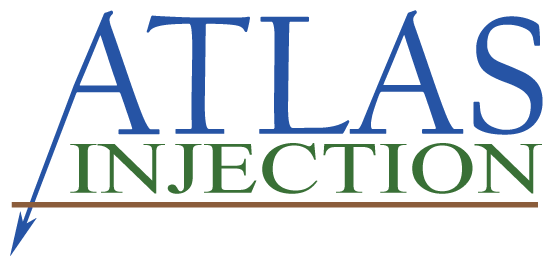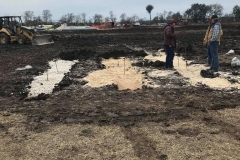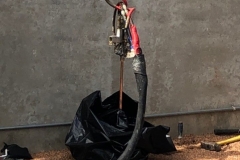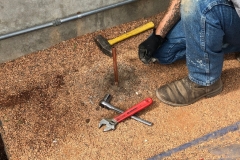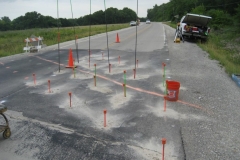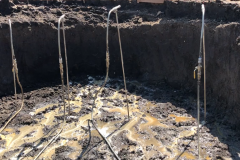Soil Swell Reduction & Stabilization
Soil Swell Reduction & Stabilization:
What is soil stabilization?
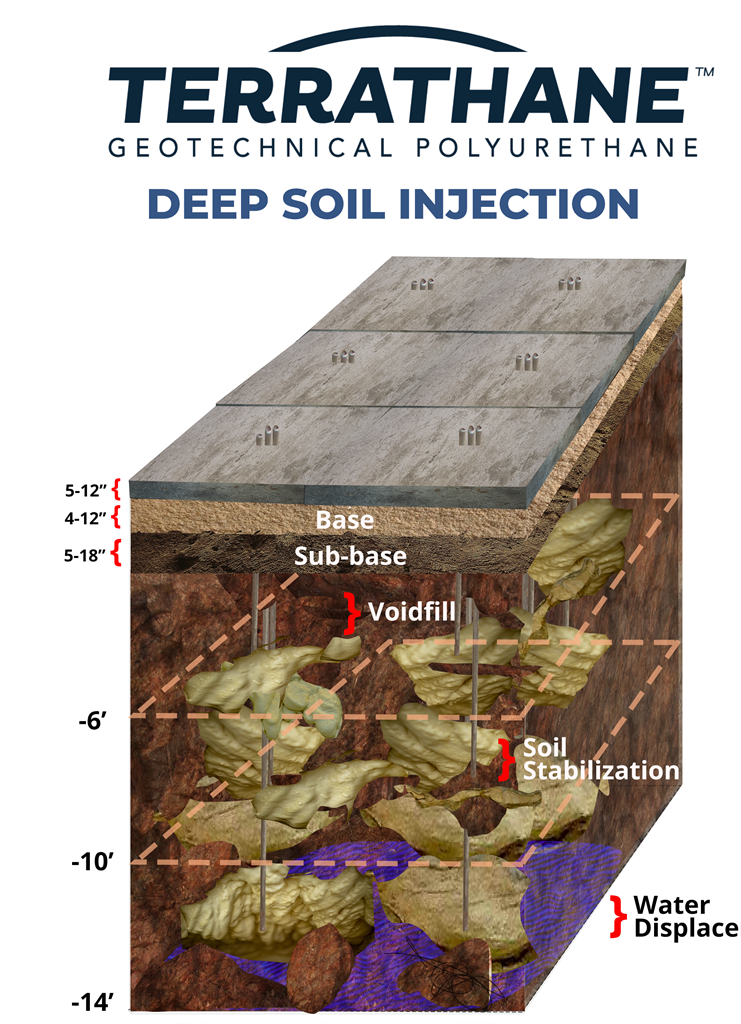 In simple terms, soil stabilization significantly reduces the swell potential of expansive soil, reduces the upward movement with our Chemical injection process or reduces the absorption capabilities with our deep injection polyurethane process In more technical terms, soil stabilization is the process of injecting water with a chemical solution into the ground which has a two-part effect on clay filled soil. First, the water pre-swells & evenly hydrates the clay as it distributes the chemical solution. Secondly, the chemical solution the ion exchanger changes the clay’s electrochemical nature which weakens and minimizes the clay’s ability to both attract and bond with water. This is achieved because the clay bonds with the chemical solution in lieu of water, hence the ion exchange. Unlike the water/clay bond, the chemical/clay bond is permanent and will not deteriorate nor lose effectiveness over time. Once injected, the soil’s Potential Vertical Rise (PVR) or swell will be limited to approximately 1 inch. Our Deep injection polyurethane process works well on loose, less compacted soil conditions. The polyurethane when injected fills these void areas deep in the soil and compacts the loose material. The geo structural polyurethane is non-absorbent. This reduces the area of soil that can absorb excess water for swelling and is less susceptible to extreme movement. Our Deep injection process works well in sandy or loaming soil conditions with an existing surface structure in place. Please note, a geotechnical swell test is required to verify all soil swell potential.
In simple terms, soil stabilization significantly reduces the swell potential of expansive soil, reduces the upward movement with our Chemical injection process or reduces the absorption capabilities with our deep injection polyurethane process In more technical terms, soil stabilization is the process of injecting water with a chemical solution into the ground which has a two-part effect on clay filled soil. First, the water pre-swells & evenly hydrates the clay as it distributes the chemical solution. Secondly, the chemical solution the ion exchanger changes the clay’s electrochemical nature which weakens and minimizes the clay’s ability to both attract and bond with water. This is achieved because the clay bonds with the chemical solution in lieu of water, hence the ion exchange. Unlike the water/clay bond, the chemical/clay bond is permanent and will not deteriorate nor lose effectiveness over time. Once injected, the soil’s Potential Vertical Rise (PVR) or swell will be limited to approximately 1 inch. Our Deep injection polyurethane process works well on loose, less compacted soil conditions. The polyurethane when injected fills these void areas deep in the soil and compacts the loose material. The geo structural polyurethane is non-absorbent. This reduces the area of soil that can absorb excess water for swelling and is less susceptible to extreme movement. Our Deep injection process works well in sandy or loaming soil conditions with an existing surface structure in place. Please note, a geotechnical swell test is required to verify all soil swell potential.
Why is soil stabilization important?
The soil in many areas of Texas contains high percentages of clay, a type of soil that can absorb an almost endless amount of water causing extreme swelling of the ground. Clay filled soils can potentially swell in multiple inches (4”-6” +). Concrete structures such as foundations, pools, decking, and driveways are designed to withstand a limited amount of soil movement, but problems arise when soil movement exceeds the structure’s design limits.
Will my concrete never crack?
Concrete can crack for reasons other than ground movement. Soil stabilization does not guarantee that concrete will never crack since there is still a limited amount of potential soil movement. Cracks caused by soil movement, after stabilization, are typically limited to hairline cracks.
What effect does soil stabilization have on plants & animals?
The chemical and polyurethane solutions used in soil stabilization will increase the acidity of the soil which some plants do not tolerate as well, but in general it is has little to no effect on most vegetation. Please consult a landscape professional if you have additional questions regarding soil acidity and plant life. We do not perform soil PH testing. Concrete will be covering a majority of the soil that has been stabilized. Prior to injection, the water/chemical or polyurethane solution will not cause harm on contact to skin and is only slightly more acidic than white vinegar. Water refusal, the water that comes back up out of the ground during soil injections, is only slightly more acidic than coffee. To be safe, it is not recommended that pets or animals drink any run-off.
